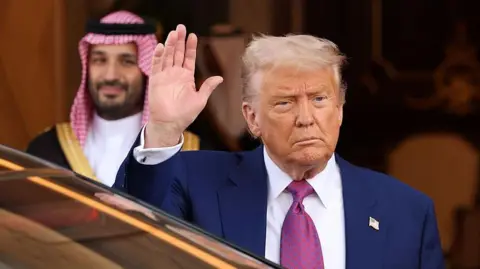During a recent trip to the Gulf, former President Donald Trump claimed to have secured deals worth over $2 trillion for the United States. Following an ambitious four-day tour through Saudi Arabia, Qatar, and the United Arab Emirates (UAE), Trump expressed his contentment with the outcomes of these high-profile engagements, asserting that it was “historic.” However, scrutiny raises questions about the legitimacy and feasibility of these figures.
The atmosphere surrounding Trump’s visit was strikingly extravagant, showcasing the political and cultural pageantry of the rich Gulf nations. From military flyovers to lavish ceremonies featuring sword dancers and royal camels, the Gulf states rolled out the red carpet. Additionally, Trump was honored with the UAE’s highest civilian award, the Order of Zayed, symbolizing the importance of the U.S.-Gulf alliance.
At the core of this diplomatic mission was Trump’s self-identified role as a “dealmaker in chief.” His ambitions were clearly laid out before his departure. In Saudi Arabia, Crown Prince Mohammed bin Salman reiterated a pledge of $600 billion in investments aimed at bolstering partnerships between the two nations. The agreements spanned various industries, including defense, AI, healthcare, and infrastructure, with a particular highlight being the massive $142 billion defense deal, described as the largest of its kind in history.
Despite the touted figures, experts and analysts express skepticism regarding the authenticity of these business promises. Prior to this visit, during the Trump administration from 2017 to 2021, an alleged $450 billion in agreements emerged from Saudi Arabia, but the actual investments totaled less than $300 billion, according to research by the Arab Gulf States Institute. Tim Callen, a former IMF official, aptly remarked, “The proof with all these [new] deals will be in the pudding,” highlighting the uncertainty surrounding these commitments.
In Qatar, Trump announced an “economic exchange” valued at $1.2 trillion; however, a detailed fact sheet revealed that only about $243.5 billion was accounted for through official contracts. One notable agreement from Qatar involved a $96 billion deal in which Qatar Airways would purchase 210 new passenger aircraft from Boeing, a move expected to create substantial job opportunities in the U.S.
The UAE, meanwhile, manifested its intent to build the world’s largest AI campus outside the U.S., with an initial agreement to acquire advanced microchips from Nvidia. This venture fell under a broader pledge by the UAE to invest $1.4 trillion in the United States over the coming decade, signaling a shift in the economic relationship toward technological collaboration.
Nevertheless, the overarching challenge persists: the actualization of these ambitious figures is contingent on unstable oil prices, amid global economic concerns heightened by trade tariffs. As oil prices faced downward pressure, the financial capabilities of Gulf states to fulfill these commitments were put into question. Analysts, including Callen, warned that the current market climate might hinder Saudi Arabia from deploying the announced $600 billion, further complicating the promises made during Trump’s visit.
Additional scrutiny surrounds the nature of many agreements reached during the tour, as many were non-binding memorandums of understanding rather than solidified contracts. Critics pointed out the disparity between announced figures and the reality of formal commitments.
Despite these challenges, the essence of Trump’s dealings marks a progressive realignment in U.S.-Gulf relations. The emphasis on AI and technology indicates a shared aspiration for deeper economic collaboration rather than the traditional oil-for-security paradigm. It reflects an evolving geopolitical landscape where the U.S. and Gulf states are attempting to devise a forward-looking partnership marked by innovation.
In perspective, while the Gulf states seek to enhance their global standing, Trump positions these deals as evidence of his economic policies’ effectiveness, potentially impacting both his legacy and the political narrative leading up to future elections. The coming years will determine whether these agreements materialize into significant investments or remain largely underwhelming in impact. As Trump aptly remarked at the conclusion of his journey, the credit for any future successes would undoubtedly be a topic of fierce debate.



